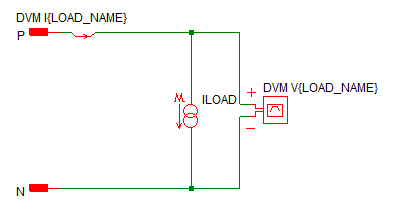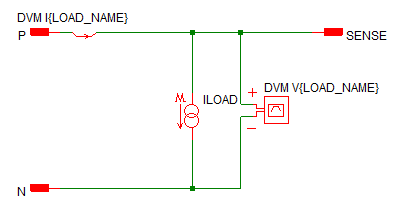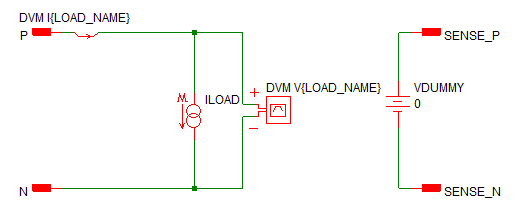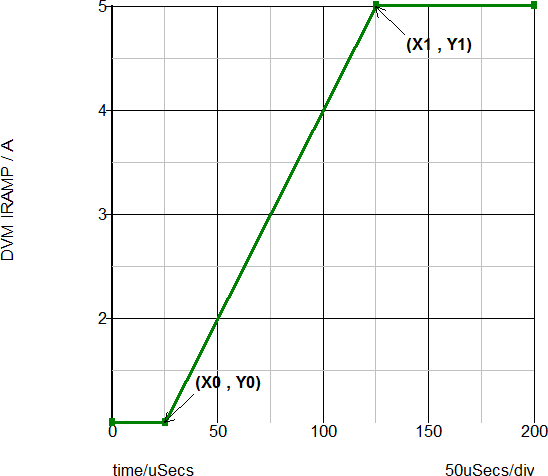Ramp Pure Load
The Ramp Pure Load subcircuit models a single ramped or stepped load current using a PWL current source. The Ramp Pure Load subcircuit is not used in any test objectives. You can configure any managed DVM load to a Ramp Pure Load with a RampPure() function call in the testplan Load column.
Other similar loads include the following:
- Ramp Load - a ramped load where the starting current is modeled with a resistor and the ramp current is modeled with a PWL current source
- Pulse Load - Single Current Pulse - a single current pulse load with the starting current modeled with a resistor
- Pulse Load - Single Pure Current Pulse - a single current pulse load with the starting current modeled without a resistor
In this topic:
| Model Name | Ramp Pure Load | ||||
| Simulator |

|
This device is compatible with both the SIMetrix and SIMPLIS simulators. | |||
| Parts Selector Menu Location |
|
||||
| Symbol Library | None - the symbol is automatically generated when placed or edited. | ||||
| Model File | SIMPLIS_DVM_ADVANCED.lb | ||||
| Subcircuit Names |
|
||||
| Symbols |
|
||||
| Schematic - 2 Terminal |

|
||||
| Schematic - 3 Terminal |

|
||||
| Schematic - 4 Terminal |

|
||||
Parameters
DVM uses the parameter values passed into the RampPure() function and does not perform calculations as it does for the Ramp Load function.
The table below explains the parameters used in the Ramp Pure Load subcircuit.
| Parameter Name | Default | Data Type | Range | Units | Parameter Description |
| FINAL_CURRENT | 750m | Real | min: 0 | A | The final current for the load. The Ramp Pure Load continues at this current for all simulation times greater than TIME_DELAY + RISE_TIME. |
| LOAD_NAME | LOAD | String | n/a | n/a | Name of the DVM load. This name cannot contain spaces. |
| RISE_TIME | 100u | Real | min: 0 | s | The ramp rise time in seconds |
| START_CURRENT | 0 | Real | min: 0 | A | The starting current for the load |
| TIME_DELAY | 10u | Real | min: 0 | s | The time delay before the ramp initiates |
Testplan Entry
To set any managed DVM load to a Ramp Pure Load subcircuit, place a RampPure() testplan entry in the Load column.
The RampPure() testplan entry has the following syntax with the arguments explained in the table below.
RampPure(REF, START_CURRENT, FINAL_CURRENT) RampPure(REF, START_CURRENT, FINAL_CURRENT, OPTIONAL_PARAMETER_STRING)
| Argument | Range | Description |
| REF | n/a | The actual reference designator of the DVM load or the more generic syntax of OUTPUT:n where n is an integer indicating a position in the list of managed DVM loads. |
| START_CURRENT | min: 0 | The starting current for the load. This can be a numeric value or a symbolic value, such as a percentage of full load. |
| FINAL_CURRENT | min: 0 | The final current for the load. This can be a numeric value or a symbolic value, such as a percentage of full load. |
| OPTIONAL_PARAMETER_STRING | n/a | Parameter string with timing parameters TIME_DELAY and/or RISE_TIME* |
* If both parameters are specified, join the two parameter key-value pairs with a space, as shown in the example below. The order of the parameter names does not matter.
Timing
During a StepLoad() test, DVM sets the output under test to use the Ramp Pure Load subcircuit. Then DVM sets the TIME_DELAY and RISE_TIME parameters for the Ramp Load. You can change the timing with the RampPure() function call by providing the timing parameters as an optional parameter string, which is the fourth argument to the RampPure () function call.
Example
The following example sets the first DVM managed load to a Ramp Pure Load, with a starting current of 1A and a final current of 5A. The optional parameter string in this example sets the time delay to 25us and the rise time to 100us.
| *?@ Load |
|---|
| RampPure(OUTPUT:1, 1, 5, TIME_DELAY=25u RISE_TIME=100u) |
The results of this testplan entry are shown below:

| Annotation | Parameter Value |
| X0 | TIME_DELAY |
| X1 | TIME_DELAY + RISE_TIME |
| Y0 | START_CURRENT |
| Y1 | FINAL_CURRENT |


